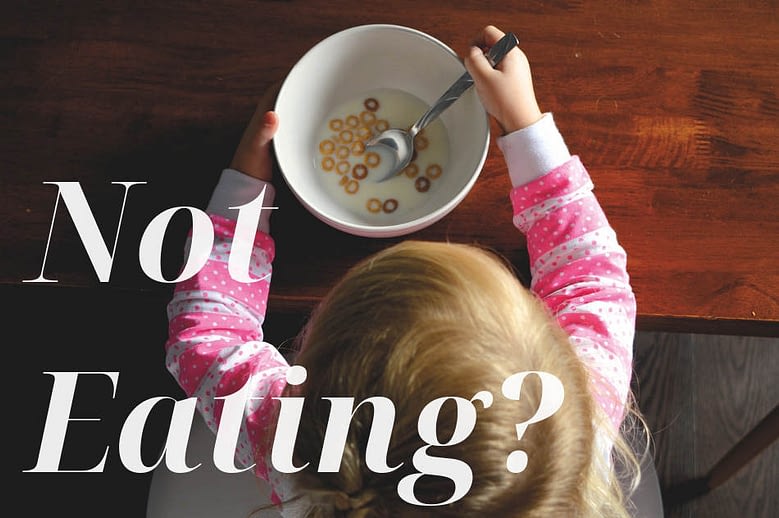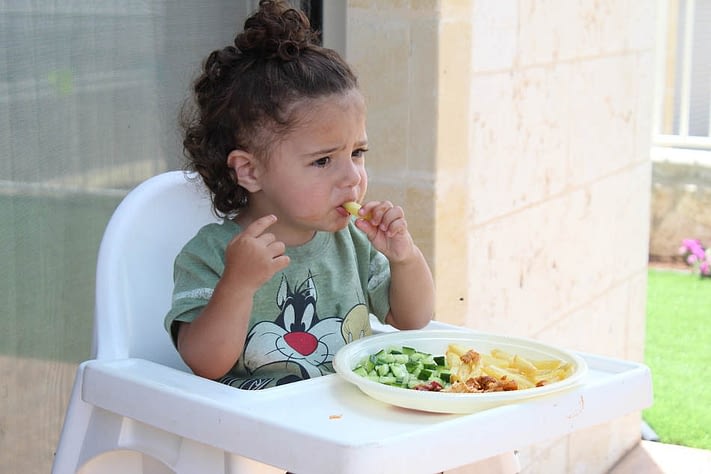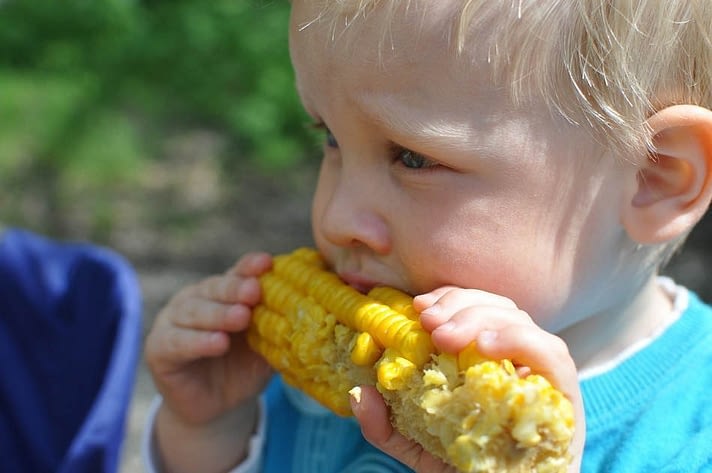Will a 3 Year Old Starve Themselves? | Toddler Eating Tips

How to Deal With a Toddler That’s Not Eating
A healthy and developmentally normal 3 year old who is a picky eater will not starve themselves. All 3 year olds go through a phase of picky eating which can be difficult for parents. It can feel like your 3 year old isn’t getting enough calories. After that first year, the weight gain that toddlers experience slows down. This leads to a reduction in their appetite as they need fewer calories.
It’s scary when a 2 / 3 year old toddler stops or reduces the amount they are eating, as a parent one of my main drives is to make sure my children eat well. I can feel that need to see them eat and thrive deep down inside me, as I’m sure you can too. Nobody likes to even think of their toddler going hungry.
So when a toddler stops eating, refuses to eat or eats less than they have previously. Alarm bells ring.
HOW CAN I GET MY TODDLER TO EAT? | 7 TIPS TO HELP THEIR APPETITE
1. TRUST IN YOUR TODDLER
Stop the pressure
Sometimes children just need the time to work through their issues with eating. It may just be that your toddler is slower than average at accepting new tastes, smells, and textures. That’s completely fine. I know it’s hard, but until they are really falling behind you shouldn’t rush to interfere.
Put your anxieties to one side and trust in your toddler. Give them the time to develop at their own pace.
2. TRUST IN THE POWERFUL NATURAL DRIVE TO EAT
Healthy children have a remarkable capacity to maintain their energy balance over time when offered an assortment of nutritious foods
Alexander KC Leung, Valérie Marchand, Reginald S Sauve, and Canadian Paediatric Society, Nutrition and Gastroenterology Committee
Your toddler’s body will do everything in its power to ensure that they are getting the right amount of calories in their diet to fuel their busy days.
Our bodies have evolved over many thousands of years and these inbuilt drives to thrive are strong, in most cases, they can be counted on to nudge our children in the right direction, even if it takes a little longer for some. Just have patience and give it time.
If you are worried then you can check how many calories your toddler needs and then track if they are getting enough through an app like MyFitnessPal or Chronometer (This is the one I use, it tracks calories and nutrition like vitamins and minerals). You might be surprised at the results.
3. LIMIT THE SNACKS
Snacks can interfere with your 2 / 3 year old’s normal healthy and nutritious meals. If your toddler fills up on snacks that lack good nutrition throughout the day. They are more likely to eat less at mealtimes, which is where the main source of good nutrition should be coming from.
That’s not to say they can’t have any snacks. Allow them two healthy snacks a day (ideally fruit/vegetables/nuts). Then concentrate on making their main meals as healthy, fun and nutritious as you can.
Examples of healthy snacks:
- Hummus with carrot and celery sticks
- Sliced apples with cinnamon
- Avocado on toast
- Raisin & nut trail mix
- Dried fruit (Dried strawberries are a real winner in our house)
- Crunchy whole grain low sugar cereal in a bowl with no milk
4. BEWARE OF HIDDEN CALORIES
Extra calories usually hide in drinks and they can suck away your toddler’s appetite. Here are some surprising examples of drinks that you should cut down on in between meals if you want your toddler’s appetite to increase at mealtimes (2). Who knew there could be so many calories in everyday drinks?
- Milk: 154-220 Calories
- Fruit Juice: 157-168 Calories
- Sugary Sodas: 124-189 Calories
- Bottled Sweet Tea: 129-143 Calories
Encourage your toddler to drink more water. Cut down on drinks that contain calories. Every calorie your toddler drinks is less nutritious than a calorie they would have consumed during mealtimes.
If your child does drink sugary sodas or fruit juice. It is very important to limit the amount of juice and soda your child drinks through the day. They can easily get through a couple of barely nutritious but calorific drinks every day if they are thirsty and on the go.
Change sugary drinks to water, then you can make sure your toddler has a healthy appetite and get their calories from nutritious meals you provide rather than sugary drinks.
5. MAKE MEALTIMES GREAT AGAIN
Put the fun back into mealtimes. Bust the stress around not eating. Diffuse the pressure around sitting down and enjoying food together.
Toddlers can pick up on your anxiety around them eating well. You could be changing their attitudes towards food without realizing.
- Think positively and make it a point to stop discussing how much they aren’t eating.
- Make food fun and interesting for them.
- Make sure they have some of their favorites on offer as well as new tastes.
- Try to reduce your own anxiety around mealtimes to make sure your toddler has a relaxing experience.
- Don’t judge how much they have eaten on any one meal. Look at the food they have eaten over the day or the week?. Maybe they had much more at breakfast than usual?
- Get your toddler involved in preparing meals, it will make them more involved in eating their meals.
Mealtimes should be relaxing family time, free from distractions and pressure. Don’t forget to take the pressure away from yourself as well! Sit down and eat with your toddler. Be a good example.
6. SET A TIME LIMIT
Don’t let mealtimes turn into a lengthy, stressful battle. Sometimes your toddler will be tired, cranky, or not hungry. They could be all of those things at once. If you lengthen the amount of time you are trying to encourage them to eat you are stretching their already naturally short attention spans.
Limit their meals to around 20 minutes. If they haven’t finished their meal by then and they aren’t interested. Take it away and don’t offer an alternative food.
This stops mealtimes becoming a long and drawn out affair. Which is better for your toddler and you. It gives your toddler the chance to build up an appetite for their next meal.
7. FOLLOW THEIR LEAD
Let your toddler play with their food. Let them explore it. They are learning to eat and that means there is going to be a little mess.
Throw away the book on table manners, learning to eat healthy nutritious food comes first!
Try to let your toddler feed themselves as much as possible. They crave independence at this age, so sometimes taking that away from them can mean they refuse to eat.
If your toddler is upset, cranky, tired or just not interested in the food for a period of time. Take the food away. Listen to what your toddler is trying to tell you. But that doesn’t mean you won’t try again at their next mealtime.

WHY WON’T MY TODDLER EAT? | 11 EASILY MISSED REASONS
There are many reasons why a toddler at 2 / 3 years old refuses to eat. It is extremely frustrating as a parent trying to feed your toddler while they’re in this phase. You can end up spending hours in the day just trying to get them to eat even a small plate of food.
I know it can feel like a battle, unfortunately, your child can sense this anxiety and frustration around food too. That’s why it’s important to find a sensible solution without stressing yourself or your child in the process.
Let’s look at some of the not so obvious reasons why your 2 / 3 year old may not be eating as well as you think they should:
1. A DECREASE IN APPETITE CAN BE NORMAL FOR A TODDLER
A decrease in appetite is normal for children two to five years of age and that their food consumption moderates to match a slower rate of growth.
Alexander KC Leung, Valérie Marchand, Reginald S Sauve, and Canadian Paediatric Society, Nutrition and Gastroenterology Committee
You will of noticed that before your child became a toddler their rate of growth was phenomenal. You can almost see them getting bigger and developing every day. When they become a toddler, it is a natural part of their development that their growth rate slows down. This can lead to a decrease in appetite and is completely normal.
2. YOUR TODDLER IS ILL
The reason for your child’s loss of appetite could be as simple as them feeling a little under the weather. Just as we do when we are ill, our appetite reduces.
This is probably due to the body trying to conserve energy by diverting it away from your gut and using it to help fight off any illness. If this is the reason for the loss of appetite in your toddler, it should be short lived, if their appetite does not return after their illness is over then this could be cause for concern and time to seek professional advice.
3. THEY ARE IN A PICKY EATING PHASE
Your 2 / 3 year old toddler might just be going through a phase of picky eating. It’s common in toddlers around this age to be more fussy about the foods that they are eating.
This can lead to a reduction in the amount that they eat throughout the day. Your toddler’s sense of taste is different to ours, theirs is much more sensitive to new foods. It’s a lot for them to take in with all these new, tastes, textures, and smells.
There is evidence that toddlers “Picky Eating” is a myth. That it is brought on by parents unrealistic expectations for how much their toddlers should eat. (3)
4. THEY ARE TIRED OR OVERTIRED
I’m sure that you’ve experienced tiredness/overtiredness in your toddler before. The mood that they can get themselves into can be very frustrating, refusing to settle even for their favorite things.
A t 2 / 3 years old they don’t yet have the capacity to effectively ration their energy. This means they can get very excited and active and then crash or become so sleepy they can barely lift their heads. Then it’s up to you to try and pick up the pieces. If this coincides with mealtimes then you can guess just how much your 3 year old will want to eat… (Very little!).
So it is important that your toddler has a good nights rest and maybe even a nap during the day if they need it.
5. PRESSURE FROM YOU TO EAT
As a parent, you know how important it is to get good nutrition and I know you want to pass that idea on to your children.
As well meaning as you are, sometimes you can pass on your emotions to them. If a child is struggling to eat, this may put pressure on us as parents to make sure they do. Then we can accidentally transfer this pressure onto them.
Your toddler is very intelligent and very sensitive to your emotions, much more than we give them credit for. This pressure around mealtimes that they pick up can stay with them and they may develop into difficulty around eating.
Toddlers at the ages of 2 and 3 are struggling to develop a sense of independence. They might prefer to feed themselves or select foods that they like. If this goes against your idea on how and what they should eat, your toddler’s need for independence could lead to them refusing to eat.
6. PUT AN END TO GRAZING
If your toddler refuses to eat much at mealtimes, you need to look at what they are eating throughout the day. If they are eating a lot of snacks but in between meals, these may be filling them up with calories and sucking away their appetite. Then when it comes to the meals later in the day, they might seem less hungry and refuse to eat much.
Put an end to grazing throughout the day. Limit your toddler to two healthy snacks a day. Then concentrate on the three healthy meals they should be eating.
7. THEIR EATING ENVIRONMENT
Pay attention to the environment your toddler is eating in. It can play a large part in their enjoyment of the meal. If their surroundings are busy and noisy, they have a lot of distractions from their food. If their favorite toys are in eyesight, their excitement may make their minds wander from the task in hand.
Loud music, people rushing backward and forth. Television on, playing with your phone.
You need to stop all the distractions you can. Create a calming and focused environment, where your toddler can concentrate on eating their food in peace.
Give them your full attention, sit down with them and eat your meal. Make it a wonderful family experience and your toddler will look forward to mealtimes.
8. FOOD ALLERGIES
Your toddler could have an undiagnosed food allergy or even just an intolerance.
If your toddler has an allergy or intolerance just think of how this could impact their enjoyment of eating. If you had a stomach ache after every meal you would probably want to eat less too. Some of these allergies/intolerances can develop through childhood and become more pronounced, coming out of nowhere.
Approximately 90 of all food allergies are caused by the following eight foods (4):
- Milk
- Eggs
- Wheat
- Soy
- Tree Nuts
- Peanuts
- Fish
- Shellfish
If you think an allergy or intolerance may be causing your toddler’s eating difficulties then seek professional medical advice. Try not to be tempted to self-diagnose.
9. LACK OF FOOD VARIETY
A lack in variety of food they are eating can make it seem like your toddler is not eating enough. At this stage in their lives, children are still exploring the world, experiences that are normal to us can be extremely stimulating to them. New foods, tastes, textures, and smells can be scary or unusual to them.
This may lead them to stick to their favorite foods and be slow to try new things. Toddlers tend to be ‘neophobic‘ which means they do not like new foods (3).
They will however gradually introduce new foods if their development progresses normally, although this may seem slow to us it is completely normal for them. Make sure you are serving the same foods multiple times, before deciding they don’t like them. It could take many tries before your toddler accepts new foods.
10. TEXTURE SENSITIVITY
Toddlers, like adults, are not only sensitive to the taste of foods they can also be sensitive to the texture. Slimy mushrooms, rubbery vegetables, and soggy foods can make even adults turn their noses up at them. When this is combined with the fact that those foods are completely new to your 2 / 3 year old toddler, this can make them look picky.
New senses can be sometimes overwhelming for toddlers. The best way to overcome this is to make sure you are giving your toddler time to play and explore the food they are eating. Then they can become comfortable enough with it to start exploring it with their mouths. Don’t get discouraged if they refuse to eat a type of food the first time. You might have to reintroduce a food many times before they add it to their favorites.
11. YOUR TODDLERS NEED FOR INDEPENDENCE
You know how strong your toddlers need for independence is. This could be interfering in their mealtimes.
Toddlers at 2 / 3 years old have a need to develop their own self-confidence and independence. This could lead to them becoming more selective in their choice of foods or just refusing to eat. The drive for independence is a natural and healthy part of their development. There are ways we can help them satisfy their need for independence at mealtimes and their need for good nutrition:
- Involve them in decisions about food. Give them a choice between what foods they want to eat. Keep the between two options so it doesn’t overwhelm them or you.
- Try not to force or push them to eat food, any kind of pressure will wake up their need for independence and you will find they become more stubborn. Keep mealtimes as relaxed as possible.

WILL MY TODDLER GROW OUT OF A PICKY EATING PHASE?
Picky eating for children around 2 to 3 years old is common. Most children over the coming years will grow out of this. That’s not to say that there aren’t a smaller percentage of children who will really struggle with eating throughout the coming years. The best thing you can do is to try and help your child through this phase by using proven strategies. If you feel your child is really struggling and this lasts for a long period of time or they start to lose weight on a regular basis then you should consult a medical professional for further advice.
If children who have more severe eating problems now are then left to their own devices for a long period of time this may make the job harder in later years to reverse their habits as they become set in their ways. If you feel like your child has a bigger issue than just picky eating, don’t delay and seek professional medical advice.
TODDLER NOT EATING | WHEN TO WORRY
I work in mental health. Every day in my job I work with young people who have issues around eating. Those young people have extreme conditions such as anorexia. It leads them to lose weight and experience serious health complications. It can be a very stressful job at times, watching those young people struggle with something everyone just takes for granted. These experiences will stay with me for the rest of my life.
Issues with eating start in our toddler years, it’s important to set your 3 year olds on the right path now.
I am not saying your child will develop eating disorders, but every single child who does is one too many. 0.9% of women in the US will suffer from Anorexia in their lifetime (1).
If you feel like your child is rapidly losing weight due to a resistance to eating it may be beneficial to seek professional advice. A 3 year old who find mealtimes extremely anxiety provoking and stressful could end up losing weight. Try not to confuse this with a typical toddler who is going through their normal exploration of food.

Leave a Reply